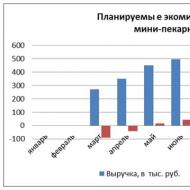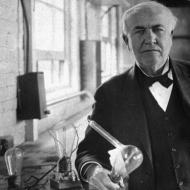
Methods for conducting a competition for replacement. Methodology for organizing and conducting the competition. Rules for organizing the competition
Application
to the order of the Ministry of Labor
and social protection of the Russian Federation
dated July 18, 2012 N 27n
Methodology
holding a competition to fill a vacant position in the federal state civil service in the Ministry of Labor and Social Protection of the Russian Federation
I. General provisions
1. This Methodology for conducting a competition for filling a vacant position in the federal state civil service in the Ministry of Labor and Social Protection of the Russian Federation (hereinafter referred to as the Methodology) is determined in accordance with the Federal Law of July 27, 2004 N 79-FZ "On the State Civil Service of the Russian Federation "(hereinafter referred to as the Federal Law) organization and procedure for holding a competition to fill a vacant position in the federal state civil service (hereinafter referred to as the civil service position) in the Ministry of Labor and Social Protection of the Russian Federation (hereinafter referred to as the Ministry).
2. The main objectives of holding a competition to fill a vacant civil service position in the Ministry (hereinafter referred to as the competition) are:
ensuring the constitutional right of citizens of the Russian Federation to equal access to the civil service;
ensuring the right of federal civil servants of the Ministry (hereinafter referred to as civil servants) to career advancement on a competitive basis;
formation of the Ministry’s personnel reserve to fill civil service positions;
selection and formation on a competitive basis of highly professional personnel of the Ministry;
selection and formation of the Ministry’s personnel reserve based on the results of competitive procedures for concluding a training agreement between the Ministry and a citizen of the Russian Federation with the obligation to subsequently serve in the federal state civil service in the Ministry;
improving the selection and placement of personnel.
II. Organization of the competition
4. The quantitative and personal composition of the commission for holding a competition to fill a vacant position in the federal public civil service in the Ministry (hereinafter referred to as the Commission) is approved by order of the Ministry, taking into account the requirements of Article 22 of the Federal Law.
The Commission consists of a chairman, deputy chairmen, a secretary and members of the Commission.
The composition of the Commission is formed in such a way as to exclude the possibility of conflicts of interest that could affect the decisions taken by the Commission.
The Secretary of the Commission ensures the work of the Commission (registration and acceptance of applications, keeping records of them, preparing files, keeping minutes of the Commission meeting, etc.).
The composition of the Commission for holding a competition to fill a vacant position in the civil service, the performance of official duties for which involves the use of information constituting state secrets, is formed taking into account the provisions of the legislation of the Russian Federation on state secrets.
6. The competition is held in two stages. At the first stage, the department of civil service, personnel and prevention of corruption and other offenses of the Department of Administration of the Ministry organizes:
preparation for publication of an announcement of a competition, a sample of which is provided in Appendix No. 1 to this Methodology, in at least one periodical publication;
placing an announcement about the acceptance of documents for participation in the competition in at least one periodical, as well as on the official website of the Ministry on the Internet;
verification of the accuracy of information provided by a citizen upon admission to the civil service or by a civil servant (verification of the accuracy of information provided by a civil servant is carried out only if he participates in a competition to fill a vacant civil service position belonging to the highest group of civil service positions);
checking compliance with qualification requirements (level of education, length of service in civil service (other types of civil service) or length of service (experience) of a citizen (civil servant) in their specialty);
with the consent of a citizen (civil servant), carrying out the procedure for registering his access to information constituting state and other secrets protected by law, if the performance of official duties in the civil service position for which the citizen (civil servant) is applying is associated with the use of such information;
informing citizens (civil servants) by post and by sending letters by e-mail about admission (denial of admission) to participate in the competition, about the place, time and procedure for holding the competition and about its results.
7. A citizen of the Russian Federation who has expressed a desire to participate in the competition submits to the Ministry:
a) personal statement;
b) a personally completed and signed questionnaire in the form approved by order of the Government of the Russian Federation of May 26, 2005 N 667-r (Collection of Legislation of the Russian Federation, 2005, N 22, Art. 2192; 2007, N 43, Art. 5264), with a photograph attached;
d) documents confirming the necessary professional education, work experience and qualifications:
a copy of the work book (except for cases when official (labor) activities are carried out for the first time) or other documents confirming labor (official) activities;
copies of documents on professional education, as well as, at the request of a citizen, on additional professional education, on the conferment of an academic degree, academic title, notarized or certified by personnel services at the place of work (service);
a certificate from an educational institution confirming that a citizen participating in a competition for concluding a training contract with the obligation to subsequently complete the federal state civil service in the Ministry is receiving higher vocational or secondary vocational education for the first time as a full-time student at an educational institution at the expense of the federal budget, and also containing information about the educational program that he is mastering (indicating the name of the direction of training (specialty), about the results of the citizen passing intermediate certifications in accordance with the curriculum, about his fulfillment of duties provided for by the charter and internal regulations of the educational institution;
e) a document confirming that the citizen does not have a disease that prevents him from entering or completing the civil service;
f) other documents provided for by the Federal Law, other federal laws and other regulatory legal acts of the Russian Federation on the civil service.
8. A civil servant who has expressed a desire to participate in the competition sends an application to the employer’s representative.
The Department of Civil Service, Personnel and Prevention of Corruption and Other Offenses of the Department of Administration ensures that civil servants receive the documents necessary to participate in the competition.
9. A citizen (civil servant) is not allowed to participate in the competition due to his non-compliance with the qualification requirements for a vacant position in the civil service, as well as due to the restrictions established by the legislation of the Russian Federation on the civil service for admission to the civil service and its passage.
10. The documents specified in paragraph 8 of this Methodology are submitted to the department of civil service, personnel and prevention of corruption and other offenses of the Department of Business Administration within 21 days from the date of announcement of their acceptance.
Late submission of documents, submission of them not in full, or in violation of the rules of registration without a good reason are grounds for refusing to accept them to a citizen.
If documents are not submitted on time, they are not submitted in full, or in violation of the registration rules, for a good reason, the employer’s representative has the right to postpone the deadline for their acceptance.
11. The decision on the date, place and time of the second stage of the competition is made by the employer’s representative after checking the accuracy of the information provided by applicants for a vacant civil service position, as well as after obtaining, if necessary, access to information constituting state and other secrets protected by law.
If, during the inspection, circumstances are identified that impede, in accordance with federal laws and other regulatory legal acts of the Russian Federation, a citizen’s entry into the civil service, he is informed in writing about the reasons for refusal to participate in the competition.
13. No later than 15 days before the start of the second stage of the competition, the Department of Administration of the Ministry sends messages about the date, place and time of its holding to civil servants (citizens) admitted to participate in the competition (hereinafter referred to as candidates).
During the competition, candidates are guaranteed equal rights in accordance with the Constitution of the Russian Federation and federal laws.
14. If, as a result of the competition, candidates who meet the qualification requirements for the vacant civil service position for which he was announced were not identified, the employer’s representative may decide to hold a repeat competition.
15. To assess the professional and personal qualities of candidates at the second stage of the competition, the following methods can be used:
testing;
survey;
conducting group discussions;
writing an abstract;
individual interview and other assessment methods that do not contradict federal laws and other regulatory legal acts of the Russian Federation.
The use of all listed methods is not mandatory. The need, as well as the order of their application during the competition, is determined by the Commission. If the winner of the competition for a vacant position is identified by only one of them (for example, an individual interview), the competition can be considered completed.
Testing of candidates for a specific vacant civil service position is carried out according to a single list of theoretical questions prepared in advance by the structural unit of the Ministry in which the competition is held to fill the vacant civil service position. The test is compiled on the basis of the qualification requirements for a vacant position in the civil service and other provisions of the job regulations for this position, established by the Ministry.
Candidates for a vacant civil service position are given the same amount of time to prepare a written response.
The test is scored by the Commission based on the number of correct answers in the absence of candidates.
Group discussions are based on practical issues - specific situations prepared in advance by the structural unit of the Ministry in which there is a vacant position.
Candidates for a vacant civil service position receive the same practical tasks and have the same time to prepare an oral (written) response. The assessment and selection of a candidate for a vacant civil service position, taking into account the results of the response and participation in the discussion, is carried out by the Commission in the absence of candidates.
To write an abstract, questions related to the performance of official duties and powers in the position for which candidates for a vacant civil service position are applying are used. The topics of the abstracts are determined by the structural unit of the Ministry in which there is a vacant position.
Candidates for a vacant civil service position write an essay on the same topic and have the same time to prepare it.
In the absence of the candidate, the commission evaluates abstracts based on the quality and depth of presentation of the material, completeness of disclosure of issues, and proficiency in the state language.
16. A meeting of the Commission is held if there are at least two candidates.
A meeting of the Commission is considered valid if at least two thirds of the total number of its members are present. Decisions of the Commission based on the results of the competition are made by open voting by a simple majority of votes of its members present at the meeting.
17. The decision of the Commission is made in the absence of the candidate and is the basis for his appointment to a vacant civil service position, inclusion in the personnel reserve within a group of positions, or refusal of appointment.
18. The voting results of the Commission are formalized by a decision, which is signed by the chairman, deputy chairman, secretary and members of the Commission who took part in the meeting, and by a protocol, which is signed by the chairman and secretary of the Commission.
III. Final provisions
19. Based on the results of the competition, an order of the Ministry is issued to appoint the winner of the competition to a vacant position in the civil service and a service contract is concluded. If a decision is made to include a candidate in the personnel reserve (within a group of positions), an order of the Ministry is issued, of which the candidate is notified in writing.
Based on the results of the competition for concluding a training agreement between the Ministry and a citizen of the Russian Federation with the obligation to subsequently undergo federal state civil service in the Ministry, an order of the Ministry is issued and an agreement is concluded with the relevant educational institution.
Information about the results of the competition, a sample of which is provided in Appendix No. 2 to this Methodology, is posted on the Ministry’s website in the public information and telecommunications network.
Candidates who participated in the competition for vacant positions in the Ministry are sent written messages within 7 days from the date of completion of the competition.
20. Documents of applicants for filling a vacant position in the civil service who were not allowed to participate in the competition, and candidates who participated in the competition, can be returned to them upon their written application addressed to the director of the Department of Administration of the Ministry within three years from the date of completion of the competition. Until the expiration of this period, the documents are stored in the archives of the Ministry, after which they are subject to destruction.
- Appendix No. 1. Announcement of a competition to fill a vacant position in the federal state civil service
competitive events
Pedagogical purpose of competitive events:
Identification of the level of special training of children in a certain type of activity;
Identification and support of creatively gifted children;
Stimulating the creative activity of students in children's associations of additional education;
Support for creatively working teachers of additional education;
Organizational and moral support for this type of creativity.
Forms of competitive events: competition (tournament), festival, Olympiad, exhibition-competition, competition of children's works (in a certain type of creative activity), competition of young performers (soloists, ensembles, mass groups), review competition, thematic competition or festival, skill competition.
Levels of organization and conduct of competitive events: international, federal, regional, city, district, district, institutional, competitive event within one children's association.
The main stages of organizing and conducting a competitive event:
Stage 1 - creation of an initiative group, determination of the level and thematic focus of the competitive event, determination of its organizers;
Stage 2 - development of regulations on the competitive event (see below);
Stage 4 - organizing and conducting organizational and methodological activities (meetings, consultations, master classes, etc.) for teachers - future participants in the competitive event;
Stage 5 - collection of applications for participation in the competitive event;
Stage 6 - drawing up a plan for conducting a competitive event (schedule for viewing or listening, plan for a competitive exhibition, etc.), forming a jury;
Stage 7 - organizing contacts with competition participants and resolving organizational issues;
Stage 8 - organization and conduct of the main competitive events (viewings, auditions, exhibitions, competitive events, etc.);
Stage 9 - summing up the results of the competition, determining the winners of the competition event;
Stage 10 - organization and holding of final events (gala concerts, demonstration performances, etc.), awarding the winners;
Stage 11 - organization and conduct of methodological events for teachers - participants in the competitive event (analysis of the results of the competitive event).
Additional actions during the organization and conduct of a competitive event:
Children must be present at children’s competition events: they can simply be spectators, or they can participate in the work of the children’s jury or choose the best participant in the competition in the “Audience Award” nomination;
to attract attention to the competitive event, it is necessary to post a poster and distribute invitation cards several days before it takes place (it is imperative to send invitation cards to all members of the initiative group of this competitive event, as well as to the heads of educational authorities and local administration);
the competition venue should be equipped and decorated in accordance with the specifics of this competition event;
It is better to sum up the results of the competition event and award it on a separate day, and combine the presentation of prizes and gifts with demonstration performances by the winners;
In the diplomas of the winners of the competition event, it is necessary to indicate not only the surname and first name of the child, but also the name of the educational institution and children's creative association, as well as the surname and initials of the teacher.
Structure of the regulations on the competitive event
Name of the competition (profile, topic). Initiators of the competition. Organizers of the competition. Goals of the competition. Objectives of the competition. Dates of the competition. Deadlines for submitting applications for participation in the competition. Competitors. Competition program. Competition requirements.
Summing up the results of the competition and awarding. Composition of the competition jury. Contact number:
Appendices to the regulations on the competition event:
1. Application form for participation in the competition:
Name of the competition;
Competition nomination;
Children's association (class, group);
Teacher (last name, first name, patronymic in full);
Teacher contact numbers (work and home);
Performer (last and first name of the child (name of the group), age, school, class, year of study);
Competition program (name of works, performed works, etc.);
Additional data (if necessary).
2. Label sample (for works of fine arts, arts and crafts and technical creativity):
Job title;
Performer (child's first and last name, age);
Educational institution;
Children's Association;
Teacher (last name, initials).
Concept of competition
The competition is understood as a competition, a competition between several individuals in the field of science, art, etc., with the goal of identifying the most outstanding competitor for victory.
There is another definition of competition. For example, a competition is the process of determining the best one or more candidates to win, in accordance with rules that must be determined before the start of the competition.
Determining the winners of the competition
The winners of the competition can be determined by voting (quantitative research) or examination (qualitative research).
Definitions
Expertise is a special form of data analysis, which is carried out in a prescribed form and meets the developed requirements.
Voting is a method of decision-making by a group of people (meeting), in which the general opinion is formulated by counting the votes of group members.
The winners are determined by several methods:
- In a quantitative study, the winners are determined by popular vote. Absolutely anyone can take part in the voting. However, some competitions define voting criteria (for example, voting is only possible after reaching a certain age). Voting participants express their sympathy for a particular candidate. Based on subjective motives. At the end of the competition, the number of votes received by each candidate for victory is counted. These votes are summed up and, thus, the participant in the competition who receives the most votes becomes the winner.
- In qualitative voting, candidates for victory are evaluated by a jury appointed in advance.
This may also be a group of specially authorized persons, a panel of judges, capable of objectively assessing the characteristics and qualities of the contenders for victory. These assessments are carried out according to certain criteria and rules of the competition. Each jury member gives a rating to each contestant. At the end of the competition, these scores are summed up, and the winner of the competition is the competitor who scored the highest score among all.
- Complex evaluation techniques are also very common in determining winners. The winners are determined simultaneously by both the jury and the audience by popular vote. In this case, each of the respondent groups has a certain priority. This priority is very important for building an integral comprehensive rating of competitors.
Rules for organizing the competition
The corresponding resolution on holding the competition, which is determined by the target audience of the competition and the topic, is determined by the organizing committee.
Its purpose is to provide technical and methodological support for the conduct of competition events, as well as control over the implementation of projects that received funding based on the results of the competition and ensuring the work of the competition bodies.
The organizing committee carries out its activities on a voluntary basis. It, in turn, consists of the Presidium of the Organizing Committee and employees who organize the competition itself and provide its technical and methodological support.
The organizing committee must:
- approve certain conditions for participation in the competition at different stages of the competition;
- develop the competition tasks themselves on a pre-declared topic;
- develop evaluation criteria at different stages of the competition;
- determine the total time for holding the competition and for summing up the awards and results of the competition;
- develop a system of incentives and rewards for winners, prize-winners and simply participants.
The result of all preliminary (preparatory) work is the “Regulations on the Competition”. The regulation on the competition is a normative act that has a consolidated codification nature and which determines the competence, the procedure for education, as well as the organization of work. This provision should indicate the name of the competition itself, its purpose, clearly explain the conditions for participation in the competition, whether there are age restrictions for participants, and also announce the reward for the winner, prize-winners and participants of the competition (not always).
After the “Regulations on the Competition” have been drawn up, the Organizing Committee must direct its work to solving practical problems:
- The organizer must determine future participants in the competition. This can be done in the following ways: distributing leaflets, hanging stands or announcing at a general meeting. In this case, you can use both individual work and mass work. The choice of means to attract competition participants depends entirely on the traditions of a particular school. must find future participants in the competition.
- In addition, the competition organizer determines and provides the necessary materials that are needed to conduct the competition. But it also happens that the necessary materials for the competition must be provided by the competition participant himself, then this should be discussed in the “Regulations of the competition”, in the conditions of its program.
- Next, the organizer must invite a competent jury to evaluate the competitors and their work. This must be done if the winners are determined through a “comprehensive” or “qualitative” study.
But when selecting a jury, certain rules must also be taken into account:
Firstly, it should be taken into account that several people (3-7 people) should be involved in evaluating the contestants.
Secondly, the jury should include people who have already had experience in the activity they are to evaluate.
Thirdly, under no circumstances should you invite to the jury those people who are personally interested in the result of the competition. However, if the determination of the winners of the competition occurs through “quantitative research” (that is, through voting), then, in this case, all competition materials must be presented to the audience and must be available for viewing by anyone who wishes to vote.

The result of each competition is the summing up of the competition and the awarding of winners, runners-up and participants. Everything must be prepared in advance, awards and prizes must be prepared in advance, and the results and results of the competition must be available not only to the participants of the competition, but also to the audience.
The stage of awarding the winners can be either in person or in absentia. The in-person award ceremony takes place at a strictly defined time. This usually takes place in the form of a formal ceremony, with the participation of invited jury members, competition participants, as well as special guests (sponsors of the competition, if any).
The correspondence stage of the awarding is that after the announcement of the results, the winners, prize-winners and participants of the competition receive diplomas, diplomas or certificates sent either to educational institutions, through their representatives, or by e-mail to the participant, prize-winner or winner, or by e-mail educational institution. The correspondence stage of the award ceremony is held without special ceremonial events.















